英语专业四级考试语法
完整版专四英语语法考点分析解析
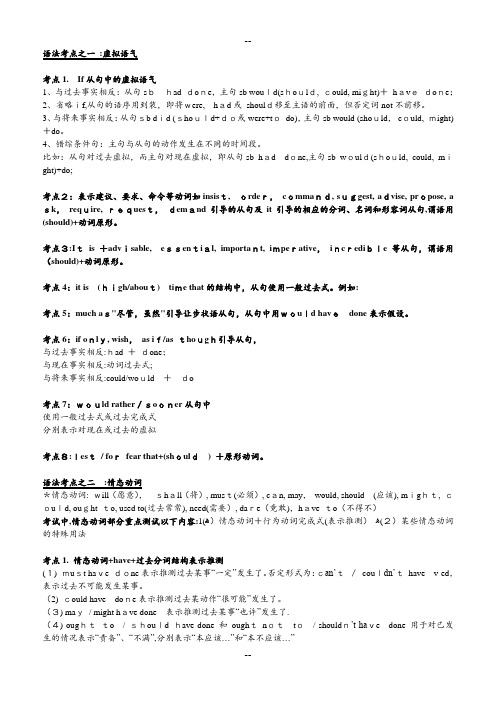
语法考点之一:虚拟语气考点1.If从句中的虚拟语气1、与过去事实相反:从句sbhad done,主句sb would(should, could, might)+havedone;2、省略if,从句的语序用到装,即将were,had或should移至主语的前面,但否定词not不前移。
3、与将来事实相反:从句sb did (should+do或were+todo),主句sb would (should,could, might)+do。
4、错综条件句:主句与从句的动作发生在不同的时间段。
比如:从句对过去虚拟,而主句对现在虚拟,即从句sb had done,主句sb would(should, could, might)+do;考点2:表示建议、要求、命令等动词如insist,order,command, suggest, advise, propose, a sk,require, request,demand引导的从句及it引导的相应的分词、名词和形容词从句,谓语用(should)+动词原形。
考点3:Itis +advisable,essential, important, imperative,incredible等从句,谓语用(should)+动词原形。
考点4:it is(high/about)time that的结构中,从句使用一般过去式。
例如:考点5:much as"尽管,虽然"引导让步状语从句,从句中用would havedone表示假设。
考点6:if only, wish,as if/as though引导从句,与过去事实相反:had +done;与现在事实相反:动词过去式;与将来事实相反:could/would+do考点7:would rather/sooner从句中使用一般过去式或过去完成式分别表示对现在或过去的虚拟考点8:lest/ forfear that+(should) +原形动词。
英语专四语法
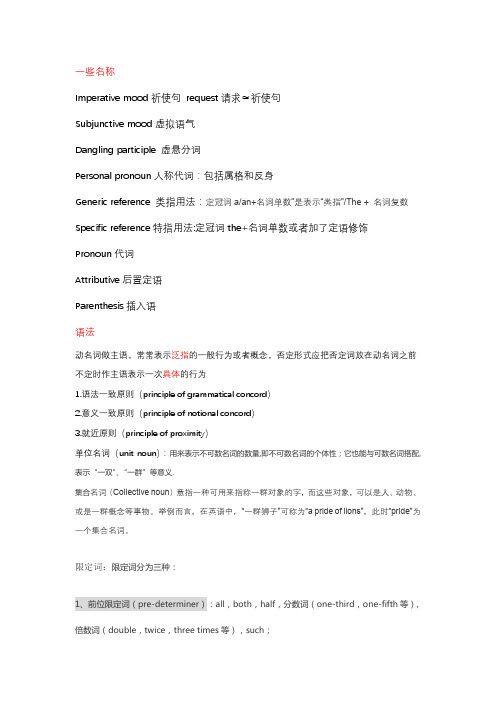
一些名称Imperative mood祈使句request请求≈祈使句Subjunctive mood虚拟语气Dangling participle 虚悬分词Personal pronoun人称代词:包括属格和反身Generic reference 类指用法:定冠词a/an+名词单数”是表示“类指”/The + 名词复数Specific reference特指用法:定冠词the+名词单数或者加了定语修饰Pronoun代词Attributive后置定语Parenthesis插入语语法动名词做主语,常常表示泛指的一般行为或者概念,否定形式应把否定词放在动名词之前不定时作主语表示一次具体的行为1.语法一致原则(principle of grammatical concord)2.意义一致原则(principle of notional concord)3.就近原则(principle of proximity)单位名词(unit noun):用来表示不可数名词的数量,即不可数名词的个体性;它也能与可数名词搭配,表示“一双”、“一群”等意义.集合名词(Collective noun)意指一种可用来指称一群对象的字,而这些对象,可以是人、动物、或是一群概念等事物。
举例而言,在英语中,“一群狮子”可称为“a pride of lions”,此时“pride”为一个集合名词。
限定词:限定词分为三种:1、前位限定词(pre-determiner):all,both,half,分数词(one-third,one-fifth等), 倍数词(double,twice,three times等),such;2、中位限定词(central-determiner):冠词(a,an,the),指示代词(this,that,these,those),不定代词(some,any,either),否定词(no,neither),全称限定词(every,each),所有格(my,your,John's);3、后位限定词(post-determiner):基数词(three,200),序数词(first,second,300th,last),数量词及短语(many,much,little,few,plenty of,a lot of,a large number of)等。
英语专四语法复习内容

英语专四语法复习内容想要通过英语专四考试,就必须掌握英语专四的语法。
那么英语专四的语法有哪些呢?下面由店铺为大家整理的英语专四语法内容,希望大家喜欢!英语专四语法内容一 There be 结构1. There be结构There were very few people left when we got there.There have been many such incidents.Nearby there had been a fight in full progress.也可以是情态动词 +beThere can be very little doubt about his guilt.There may always be instances about which we are uncertain. There ought to / should be some instructions on the lid.还可以是There +情态动词+ be 的完成时There may have been an accident.If the criminal had come this way, there would be / would have been footprints. There should / ought to have been someone on duty all the time.2. There + 半动词+ be,这里很少用完成体形式.There is certain to be trouble at the factory.There is sure / likely to be some rain tonight. There seems / appears to be no doubt about it.3. There be结构也可有被动式,这类there be结构有些可以与there be结构的一般形式相互转换。
专四必考语法
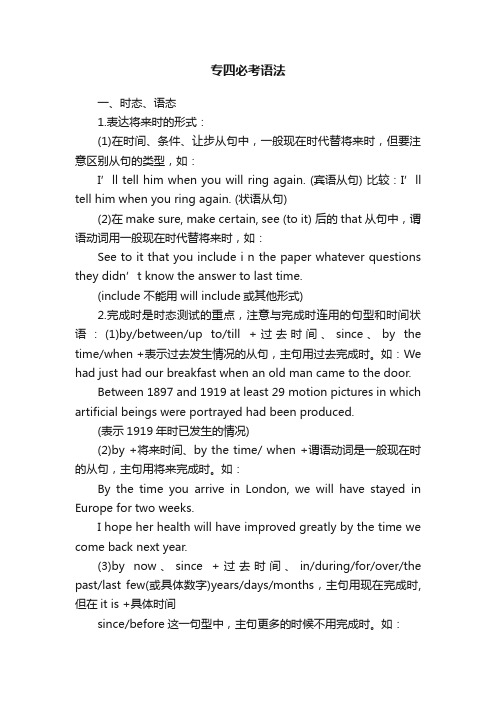
专四必考语法一、时态、语态1.表达将来时的形式:(1)在时间、条件、让步从句中,一般现在时代替将来时,但要注意区别从句的类型,如:I’ll tell him when you will ring again. (宾语从句) 比较:I’ll tell him when you ring again. (状语从句)(2)在make sure, make certain, see (to it) 后的that从句中,谓语动词用一般现在时代替将来时,如:See to it that you include i n the paper whatever questions they didn’t know the answer to last time.(include 不能用will include或其他形式)2.完成时是时态测试的重点,注意与完成时连用的句型和时间状语:(1)by/between/up to/till +过去时间、since、by the time/when +表示过去发生情况的从句,主句用过去完成时。
如:We had just had our breakfast when an old man came to the door.Between 1897 and 1919 at least 29 motion pictures in which artificial beings were portrayed had been produced.(表示1919年时已发生的情况)(2)by +将来时间、by the time/ when +谓语动词是一般现在时的从句,主句用将来完成时。
如:By the time you arrive in London, we will have stayed in Europe for two weeks.I hope her health will have improved greatly by the time we come back next year.(3)by now、since +过去时间、in/during/for/over/the past/last few(或具体数字)years/days/months,主句用现在完成时, 但在it is +具体时间since/before这一句型中,主句更多的时候不用完成时。
最新[英语考试]英语专业四级考试 语法词汇知识幻灯片课件
![最新[英语考试]英语专业四级考试 语法词汇知识幻灯片课件](https://img.taocdn.com/s3/m/4b246e063186bceb18e8bbb7.png)
D. are not long distances 6. 与冠词的搭配
___ London of Dicken’s time come to ___ in his books.
A. The, / B. /,/ C. /, the D. The,the
代词
The city council ___ meeting to discuss the point. A. is B. are C. was D. were ❖ 4) a committee,etc. of + 如果主语是由“a committee of /a panel of /a board of +复数名词”构成,随后的动词通常用
❖ 3.具体考查重点为以上项目中的特殊用法,不 常用的情况
❖ 2.习惯用法如:confess to/set about/be used to+doing; be supposed to/have/ make sb.+do
❖ 3.由同一动词构成的短语如:come,go,set, break,put
It takes ___ to build a road
A. a lot of machine B. a lot of machinery
C. much machines D. much machineries ❖ 3)既可作单数也可作复数的集体名词如: audience,
committee, class, crew, family, public, government
A. / B. that of C. which is D. of
❖ 5. 表示时间、距离、金额、重量、面积、体积、 容积等度量的名词短语做主语时,谓语用单数。 Ten miles ____ in such a large city.
英语专业四级历年语法试题(含答案)
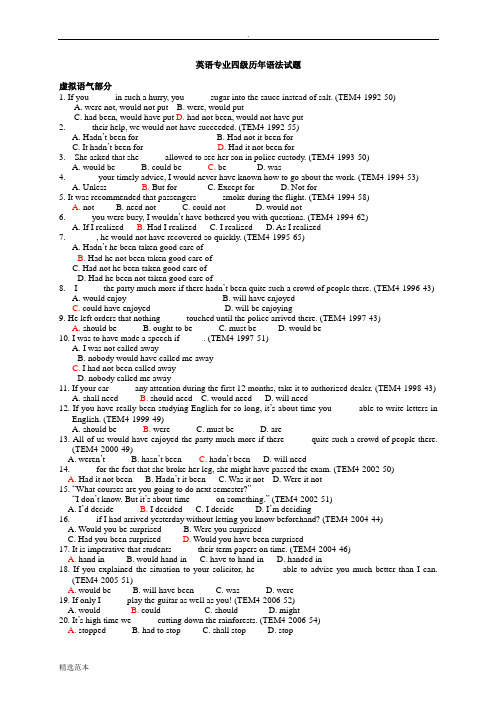
英语专业四级历年语法试题虚拟语气部分1. If you _____ in such a hurry, you _____ sugar into the sauce instead of salt. (TEM4-1992-50)A. were not, would not putB. were, would putC. had been, would have putD. had not been, would not have put2. _____ their help, we would not have succeeded. (TEM4-1992-55)A. Hadn’t been forB. Had not it been forC. It hadn’t been forD. Had it not been for3. She asked that she _____ allowed to see her son in police custody. (TEM4-1993-50)A. would beB. could beC. beD. was4. _____ your timely advice, I would never have known how to go about the work. (TEM4-1994-53)A. UnlessB. But forC. Except forD. Not for5. It was recommended that passengers _____ smoke during the flight. (TEM4-1994-58)A. notB. need notC. could notD. would not6. _____ you were busy, I wouldn’t have bothered you with questions. (TEM4-1994-62)A. If I realizedB. Had I realizedC. I realizedD. As I realized7. _____, he would not have recovered so quickly. (TEM4-1995-65)A. Hadn’t he been taken good care ofB. Had he not been taken good care ofC. Had not he been taken good care ofD. Had he been not taken good care of8. I _____ the party much more if there hadn’t been quite such a crowd of people there. (TEM4-1996-43)A. would enjoyB. will have enjoyedC. could have enjoyedD. will be enjoying9. He left orders that nothing _____ touched until the police arrived there. (TEM4-1997-43)A. should beB. ought to beC. must beD. would be10. I was to have made a speech if _____. (TEM4-1997-51)A. I was not called awayB. nobody would have called me awayC. I had not been called awayD. nobody called me away11. If your car _____ any attention during the first 12 months, take it to authorized dealer. (TEM4-1998-43)A. shall needB. should needC. would needD. will need12. If you have really been studying English for so long, it’s about time you _____ able to write letters inEnglish. (TEM4-1999-49)A. should beB. wereC. must beD. are13. All of us would have enjoyed the party much more if there _____ quite such a crowd of people there.(TEM4-2000-49)A. weren’tB. hasn’t beenC. hadn’t beenD. will need14. _____ for the fact that she broke her leg, she might have passed the exam. (TEM4-2002-50)A. Had it not beenB. Hadn’t it beenC. Was it notD. Were it not15. “What courses are you going to do next semester?”“I don’t know. But it’s about time _____ on something.” (TEM4-2002-51)A. I’d decideB. I decidedC. I decideD. I’m deciding16. _____ if I had arrived yesterday without letting you know beforehand? (TEM4-2004-44)A. Would you be surprisedB. Were you surprisedC. Had you been surprisedD. Would you have been surprised17. It is imperative that students _____ their term papers on time. (TEM4-2004-46)A. hand inB. would hand inC. have to hand inD. handed in18. If you explained the situation to your solicitor, he _____ able to advise you much better than I can.(TEM4-2005-51)A. would beB. will have beenC. wasD. were19. If only I _____ play the guitar as well as you! (TEM4-2006-52)A. wouldB. couldC. shouldD. might20. It’s high time we _____ cutting down the rainforests. (TEM4-2006-54)A. stoppedB. had to stopC. shall stopD. stop21. It is imperative that the government _____ more investment into the shipbuilding industry.(TEM4-2006-59)A. attractsB. shall attractC. attractD. has to22. If only the patient _____ a different treatment instead of using the antibiotics, he might still be alivenow. (TEM4-2007-54)A. had receivedB. receivedC. should receiveD. were receiving23. It is absolutely essential that William _____ his study in spite of some learning difficulties.(TEM4-2007-65)A. will continueB. continuedC. continueD. continues24. If there were no subjunctive mood, English _____ much easier to learn. (TEM4-2009-52)A. could have beenB. would beC. will beD. would have been一、非谓语动词部分1.The compositions contained so few errors that the teacher got the students _____ one another’s papers.(TEM4-1992-58)A. correctB. to correctC. correctingD. to be correcting2. I don’t like _____ bills but when I do get them I like _____ them promptly. (TEM4-1992-60)A. to get, payingB. getting, to payC. to get, to payD. getting, paying3. I never regretted _____ his offer, for it was not where my interest lay. (TEM4-1993-53)A. not to acceptB. not having acceptedC. having not acceptedD. not accepting4. Arriving at the bus stop, _____ waiting there. (TEM4-1994-52)A. a lot of people wereB. he found a lot of peopleC. a lot of peopleD. people were found5. _____ regular training in nursing, she could hardly cope with the work at first. (TEM4-1994-55)A. Not receivedB. Since receivingC. Having receivedD. Not having received6. The country’s chief exports are coal, cars and cotton goods, cars _____ the most important of these.(TEM4-1994-57)A. have beenB. areC. beingD. are being7. He noticed the helicopter hovering over the field. Then to his astonishment, he saw a rope ladder _____out and three men climbing down it. (TEM4-1995-52)A. throwingB. being thrownC. having thrownD. having been thrown8. He resented _____ to wait. He expected the minister _____ him at once. (TEM4-1995-53)A. to be asked, to seeB. being asked, to seeC. to be asked, seeingD. being asked, seeing9. This missile is designed so that once _____ nothing can be done to retrieve it. (TEM4-1995-63)A. firedB. being firedC. they firedD. having fired10. _____ time, he’ll make a first-class tennis player. (TEM4-1996-42)A. HavingB. GivenC. GivingD. Had11. He wasn’t asked to take on the chairmanship of the society, _____ insufficiently popular with allmembers. (TEM4-1996-45)A. having consideredB. was consideredC. was being consideredD. being considered12. In international matches, prestige is so important that the only thing that matters is to avoid _____.(TEM4-1996-48)A. from being beatenB. being beatenC. beatingD. to be beaten13. _____ no cause for alarm, the old man went back to his room. (TEM4-1996-51)A. There wasB. SinceC. BeingD. There being14. _____, he can now only watch it on TV at home. (TEM4-1998-45)A. Obtaining not a ticket for the matchB. Not obtaining a ticket for the matchC. Not having obtained a ticket for the matchD. Not obtained a ticket for the match15. The Clarks haven’t decided yet which hotel _____. (TEM4-1998-49)A. to stayB. is to stayC. to stay atD. is for staying16. _____enough time and money, the researchers would have been able to discover more in this field.(TEM4-1998-51)A. GivingB. To giveC. GivenD. Being given17. The three men tried many times to sneak across the border into the neighboring country _____ bythe police each time. (TEM4-1999-42)A. had been capturedB. being always capturedC. only to be capturedD. unfortunately captured18. Professor Johnson is said _____ some significant advance in his research in the past years.(TEM4-1999-43)A. having madeB. makingC. to have madeD. to make19. There _____ nothing more for discussion, the meeting came to an end half an earlier.(TEM4-2000-45)A. to beB. to have beenC. beingD. be20. _____ at in this way, the present economic situation doesn't seem so gloomy.(TEM4-2000-51)A. LookingB. LookedC. Having lookedD. To look21. Even as a girl, _____ to be her life, and theater audiences were to be her teachers. (TEM4-2001-42)A. performing by Melissa wereB. it was known that Melissa's performances wereC. knowing that Melissa's performances wereD. Melissa knew that performing was22. _____ him tomorrow? (TEM4-2001-43)A. Why not to call onB. Why don't call onC. Why not to calling onD. Why not call on23. ______ is not a serious disadvantage in life. (TEM4-2001-51)A. To be not tallB. Not to be tallC. Being not tallD. Not being tall24. Agriculture is the country’s chief source of wealth, wheat ____ by far the cereal crop. (TEM4-2003-41)A. isB. beenC. beD. being25. The opening ceremony is a great occasion. It is essential _____ for that.(TEM4-2003-47)A. for us to be preparedB. that we are preparedC. of us to be preparedD. our being prepared26. Time _____, the celebration will be held as scheduled. (TEM4-2003-48)A. permitB. permittingC. permittedD. permits27. If not _____ with the respect he feels due to him, Jack gets very ill-tempered and grumbles all thetime. (TEM4-2004-45)A. being treatedB. treatedC. be treatedD. having been treated28. The minister of finance is believed _____ of imposing new taxes to raise extra revenue.(TEM4-2004-48)A. that is thinkingB. to be thinkingC. that he is to thinkD. to think29. There are only ten apples left in the baskets, _____ the spoilt ones. (TEM4-2006-63)A. not countingB. not to countC. don’t countD. having not counted30. Linda was _____ the experiment a month ago, but she changed her mind at the last minute.(TEM4-2007-54)A.to startB. to have startedC. to be startingD. to have been starting31. It is not uncommon for there _____ problems of communication between the old and the young.(TEM4-2007-63)A. beingB. would beC. beD. to be32. _____ at in this way, the situation doesn’t seem so desperate. (TEM4-2007-64)A. LookingB. LookedC. Being lookedD. To look33. What does “He wisely refused to spend his money” mean? (TEM4-2008-59)A. It was wise of him to refuse to spend his money.B. He refused to spend his money in a wise manner.C. He was short of money and didn’t want to buy anything.D. He refused, in a wise manner, to spend his money.34. What a nice day! How about the three of us _____ a walk in the park nearby?(TEM4-2009-51)A. to takeB. takeC. takingD. to be taking35. "It seems that she was there at the conference." The sentence means that (TEM4-2009-62)A. she seems to be there at the conference.B. she seemed to be there at the conference.C. she seems to have been there at the conference.D. she seemed to being there at the conference.36. "The man preparing the documents is the firm's lawyer" has all the following possible meaningsEXCEPT (TEM4-2009-65)A. the man who has prepared the documents...B. the man who has been preparing the documents...C. the man who is preparing the documents...D. the man who will prepare the documents...三、动词时态和语态1. When I arrived at the meeting, the first speaker _____ and the audience _____. (TEM4-1992-47)A. had finished speaking, were clappingB. had finished speaking, had clappedC. finished speaking, clappedD. finished speaking, were clapping2. The doctor is feeling the little girl’s pulse. He says it _____ normal. (TEM4-1992-51)A. feelsB. is feelingC. has feltD. is felt3. I _____ writing the paper as scheduled, but my mother’s illness interfered. I hope you will excuse me.(TEM4-1993-54)A. am to have finishedB. was to have finishedC. was to finishD. ought to finish4. How can I ever concentrate if you _____ continually _____ me with silly questions? (TEM4-1997-41)A. have …interruptedB. had …interruptedC. are…interruptingD. were…interrupting5. Mr. White works with a chemicals import & export company, but he _____ for the industrial fair, sincehe is on leave. (TEM4-1997-44)A. has workedB. worksC. has been workingD. is working6. For some time now, world leaders _____ out the necessity for agreement on arms reduction.(TEM4-2002-43)A. had been pointingB. have been pointingC. were pointingD. pointed7. The experiment requires more money than _____. (TEM4-2002-49)A. have been put inB. being put inC. has been put inD. to be put in8. Jack _____ from home for two days now, and I am beginning to worry about his safety. (TEM4-2003-42)A. has been missingB. has been missedC. had been missingD. was missed9. James has just arrived, but I didn’t know he _____ until yesterday. (TEM4-2005-54)A. will comeB. was comingC. had been comingD. came10. _____ conscious of my moral obligations as a citizen. (TEM4-2005-55)A. I was and always will beB. I have to be and always will beC. I had been and always will beD. I have been and always will be11. That was not the first time he _____ us. I think it’s high time we _____ strong actions against him.(TEM4-2005-60)A. betrayed…takeB. had betrayed…tookC. has betrayed…tookD. has betrayed…take12. The student said there were a few points in the essay he _____ impossible to comprehend.(TEM4-2006-55)A. has foundB. was findingC. had foundD. would find13. The committee has anticipated the problems that _____ in the road construction project.(TEM4-2007-58)A. ariseB. will ariseC. aroseD. have arisen14. The student said there were a few points in the essay he _____ impossible to comprehend.(TEM4-2007-59)A. had foundB. findsC. has foundD. would find15. He would have finished his college education, but he _____ to quit and find a job to support his family.(TEM4-2007-60)A. had hadB. hasC. hadD. would have16. In his plays Shakespeare ______ his characters live through their language. (TEM4-2008-63)A. would makeB. had madeC. madeD. makes四、情态助动词的用法1.The door was open.It _____ open. I had locked it myself and the key was in my pocket. (TEM4-1992-48)A. can’t beB. mustn’t beC. can’t have beenD. mustn’t have been2. – I bought this shirt for 35 yuan yesterday.– It’s on sale today for only 30. You should have waited.– Oh really? But how _____ I know? (TEM4-1993-48)A. wouldB. canC. didD. do3. She must be in the dormitory now.No, she _____ be there. I saw her in the classroom a minute ago. (TEM4-1994-59)A. mustn’tB. can’tC. couldn’tD. wouldn’t4. He _____ the 8:20 bus because he didn't leave home until 8:25. (TEM4-1994-64)A. couldn’t have caughtB. ought to have caughtC. shouldn’t have caughtD. must not have caught5. The meeting has been cancelled. Ann _____ all that work. (TEM4-1995-55)A. need to doB. need haveC. needn’t have doneD. needed not to do6. We could _____ him with a detached house when he came, but he had specifically asked a small flat.(TEM4-1995-62)A. provideB. have providedC. not provideD. not have provided7. As it turned out to be a small house party, we ______ so formally. (TEM4-1996-49)A. need not have dressed upB. must not have dressed upC. did not need to dress upD. must not dress up8. You _____ Mark anything. It was none of his business. (TEM4-1998-52)A. needn’t have toldB. needn’t tellC. mustn’t have toldD. mustn’t tell9. He _____ unwisely, but he was at least trying to do something helpful. (TEM4-1999-48)A. may have actedB. must have actedC. should actD. would act10. Much as _____ I couldn’t lend him the money because I simply didn’t have that much spare cash.(TEM4-1999-52)A. I would have liked toB. I would like to haveC. I should have to likeD. I should have liked to11. I went there in 1984, and that was the only occasion when I _____ the journey in exactly two days.(TEM4-2005-57)A. must makeB. must have madeC. was able to makeD. could make12. _____ you _____ further problems with your printer, contact your dealer for advice. (TEM4-2005-63)A. If, hadB. Have, hadC. should, haveD. In case, had13. Loudspeakers were fixed in the hall so that everyone _____ an opportunity to hear the speech.(TEM4-2006-56)A. ought to haveB. must haveC. may haveD. should have14. I am surprised _____ this city is a dull place to live in. (TEM4-2006-57)A. that you should thinkB. by which you are thinkingC. that you would thinkD. with what you were thinking15. “You _____ borrow my notes provided you take care of them,” I told my friend. (TEM4-2007-53)A. couldB. shouldC. mustD. can16. She _____ fifty or so when I first met her at the conference. (TEM4-2007-53)A. must beB. had beenC. could beD. must have been17. Had Jud been more careful on the maths exam, she _____ much better results now.(TEM4-2008-52)A. would be gettingB. could have gotC. must getD. would get18. Which of the following sentences expresses “probability”? (TEM4-2008-52)A. You must leave immediately.B. You must be feeling rather tired.C. You must be here by eight o’clock.D. You must complete the reading assignment on time.19. She _____ fifty or so when I first met her at a conference. (TEM4-2009-53)A. had beenB. must beC. has beenD. must have been20. Aren't you tired? I ____ you had done enough for today. (TEM4-2009-61)A. should have thoughtB. must have thoughtC. might have thoughtD. could have thought五、主从复合句和某些连接用语的用法1. We could go to a concert _____ you’d prefer to visit a museum. (TEM4-1992-49)A. ifB. becauseC. unlessD. since2. _____ their policy can be changed, the future for that country will be indeed bleak. (TEM4-1993-46)A. Even ifB. UnlessC. Now thatD. As long as3. She said she would work it out herself _____ ask me for help. (TEM4-1993-47)A. and not toB. but notC. and prefer notD. rather than4. David Singer, my friend’s father, _____raised and educated in New York, lived and lectured in Africa most of his life. (TEM4-1993-57)A. whoB. ifC. whileD. though5. My Scottish friend says there is _____ monster in Loch Ness. (TEM4-1993-58)A. no such thing asB. no such thing as aC. no such a thing asD. no such a thing as a6. We can assign the task to _____ is capable and trustworthy. (TEM4-1994-54)A. whomeverB. whoC. whomD. whoever7. Only take such clothes _____ really necessary. (TEM4-1994-61)A. as wereB. as they areC. as they wereD. as are8. _____ is often the case with a new idea, much preliminary activity and optimistic discussion produced no concrete proposals. (TEM4-1994-65)A. ThatB. ItC. ThisD. As9. _____ I was very much mistaken, there was something wrong with Louise. (TEM4-1995-58)A. UnlessB. AsC. ThoughD. Since10.You won’t get a lo an _____ you can offer some security. (TEM4-1996-41)A. lestB. in caseC. unlessD. other than11. The brilliance of his satires was__ _________ make even his victims laugh. (TEM4-1996-52)A. so as toB. such as toC. so thatD. such that12. The physicist has made a discovery, _____ of great importance to the progress of science andtechnology. (TE44-1997-45)A. I think which isB. that I think isC. which I think isD. which I think it is13. _____, he is ready to accept suggestions from different sources. (TEM4-1997-46)A. Instead of his contributionsB. For all his notable contributionsC. His making notable contributionsD. However his notable contributions14. The team can handle whatever ____ _____ . (TEM4-1997-47)A. that needs handlingB. which needs handlingC. it needs handlingD. need be handled15. Come and see me whenever ___________ _____. (TEM4-1997-48)A. you are convenientB. you will be convenientC. it is convenient to youD. it will be convenient to you16. It was as a physician that he represented himself, and ______________ he was warmly received.(TEM4-1997-49)A. as suchB.such asC. as that.D.so that17. I have never been to London, but that is the city _____. (TEM4-1997-50)A. where I like to visit mostB. I’d most like to visitC. which I like to visit mostlyD. where I’d like most to visit18. She remembered several occasions in the past _____ she had experienced a similar feeling.(TEM4-1998-42)A. whichB. beforeC. thatD. when19. _____ he needed money for a new car, he decided not to borrow it from the bank.(TEM4-1998-48)A. Much asB. Much thoughC. As muchD. Though much20. His strong sense of humor was _____ make everyone in the room burst out laughing.(TEM4-1998-50)A. so as toB. such as toC. so thatD. such that21. After _____ seemed an endless wait, it was her turn to enter the personnel manager's office.(TEM4-1999-41)A. that.B. thereC. whatD. it22. It is not so much the language_____ the cultural background that makes the book difficult tounderstand. (TEM4-1999-45)A. butB. norC. asD. like23. He's _____ as a "bellyacher" — he's always complaining about something. (TEM4-1999-50)A. who is knownB. whom is knownC. what is knownD. which is known24. _____, he always tries his best to complete it on time. (TEM4-1999-51)A. However the task is hardB. However hard the task isC. Though hard the task isD. Though .hard is the task25. Acute hearing helps most animals sense the approach of thunderstorms long before people_____. (TEM4-2000-41)A. doB. hearC. do themD. hearing it26. This is an illness that can result in total blindness _____ left untreated.(TEM4-2000-42)A. afterB. ifC. sinceD. unless27. The central provinces have floods in some years, and _____. (TEM4-2000-43)A. drought in othersB. drought mothersC. while other droughtsD. others in drought28. Firms that use computers have found that the number of staff _____ is needed for quality control canbe substantially reduced. (TEM4-2000-50)A. whoseB. asC. whatD. that29. I can't go-- for one thing, I have no money, and _____ I have too much work.(TEM4-2001-41)A. what's moreB. as wellC. for anotherD. in addition30. There is no doubt _____ the company has made the right decision on the sales project.(TEM4-2001-44)A. whyB. thatC. whetherD. when31. Intellect is to the mind __________ sight is to the body. (TEM4-2001-45)A. whatB. asC. thatD. like32_____ I sympathize, I can't really do very much to help them out of the difficulties.(TEM4-2001-46)A. As long asB. AsC. WhileD. Even33. Barry had an advantage over his mother _____ he could speak French.(TEM4-2001-49)A. since thatB. in thatC. at thatD. so that34. She did her work _______ __her manager had instructed. (TEM4-2002-41)A. asB. untilC. whenD. though35. Have you ever been in a situation _____ you know the other person is right yet you cannot agree with him? (TEM4-2002-44)A. by whichB. thatC. in whereD. where36. We've just installed two air-conditioners in our apartment, _____ should make grea t differences in our life next summer. (TEM4-2002-45)A. whichB. whatC. thatD. they37. She managed to save _____ she could out of her wages to help her brother.(TEM4 2002-47)A. how little moneyB. so little moneyC. such little moneyD. what little money38. Fool _____ Jane is, she could not have done such a thing. (T EM4-2002-48)A. whoB. asC. thatD. like39. Above the trees are the hills, _____ magnificence the river faithfully reflects onthe surface. (TEM4-2003-43)A. whereB. of whoseC. whose.D. which40. _____ I like economics, I like sociology much better. (TEM4-2003-49)A. As much asB. So muchC. How much.D. Much as41. They overcame all the difficulties and completed the project two months ahead of time,_____ is something we had not expected. (TEM4-2003-51)A. whichB. itC. thatD. what42. He is quite worn out from years of hard work. He is not the man _____ he was twenty yearsago.(TEM4-2003-52)A. whichB. thatC. whoD. whom43. _____, I'll marry him all the same. (TEM4-2004-42)A. Was he rich or poorB. Whether rich or poorC. Were he rich or poorD. Be he rich or poor44. The government has promised to do _____ lies in its power to ease the hardshipsof the victims in the flood-stricken area. (TEM4-2004-43)A. howeverB. whicheverC. whateverD. wherever45. _____, Mr. Wells is scarcely in sympathy with the working class. (TEM4-2005-52)A. Although he is a socialistB. Even if he is a socialistC. Being a socialistD. Since he is a socialist46. His remarks were _____ annoy everybody at the meeting. (TEM4-2005-53)A. so as toB. such as toC. such toD. as much as to47. I know he failed his last test, but really he’s _____ stupid. (TEM4-2005-58)A. something butB. anything butC. nothing butD. not but48. He asked me to lend him some money, which I agreed to do, _____ that he paid me back the followingback. (TEM4-2005-64)A. on occasionB. on purposeC. on conditionD. only if49. _____ dull he may be, he is certainly a very successful top executive. (TEM4-2006-51)A. AlthoughB. WhateverC. AsD. However50. The party, _____ I was the guest of honour, was extremely enjoyable. (TEM4-2006-53)A. by whichB. for whichC. to whichD. at which51. Land belongs to the city; there is _____ thing as private ownership of land. (TEM4-2006-60)A. no such aB. not suchC. not such aD. no such52. There are as good fish in the sea _____ ever came out of it. (TEM4-2007-51)A. thanB. likeC. asD. so53. It is not _____ much the language as the background that makes the book difficult to understand.(TEM4-2007-57)A. thatB. asC. soD. very54. The research requires more money than _____. (TEM4-2007-61)A. have been put inB. has been put inC. being put inD. to be put in55. Overpopulation poses a terrible threat to the human race. Yet it is probably _____ a threat to the humanrace than environmental destruction. (TEM4-2007-62)A. no moreB. not moreC. even moreD. much more56. Nine is to three _____ three is to one. (TEM4-2008-53)A. whenB. thatC. whichD. what57. Men differ from animals _____ they can think and speak. (TEM4-2008-54)A. for whichB. for thatC. in thatD. in which58. _____ he wanted to go out with his friends at the weekend, he had to stay behind to finish hisassignment. (TEM4-2008-55)A. Much thoughB. Much asC. As muchD. Though Much59. I enjoyed myself so much _____ I visited my friends in Paris last year. (TEM4-2008-56)A. whenB. whichC. thatD. where60. They stood chatting together as easily and naturally as _____. (TEM4-2008-60)A. it could beB. they could beC. it wasD. was61. Quality is ______ counts most. (TEM4-2008-62)A. whichB. thatC. whatD. where62. _____ the boss says, it is unreasonable to ask me to work overtime without pay.(TEM4-2009-54)A. WhateverB. WheneverC. WhicheverD. However63. I was very interested in _____ she told me. (TEM4-2009-56)A. all thatB. all whichC. all whatD. that64. We consider ______ he should have left without telling anyone beforehand. (TEM4-2009-57)A. strange whyB. it strange whatC. it strange thatD. that strange65. The couple had no sooner got to the station _____ the coach left. (TEM4-2009-60)A. whenB. asC. untilD. than六、冠词及其他限定词的某些用法1. Ted couldn’t remember the exact date of the storm, but he knew it was _____ Sunday because everybody was at _____ church. (TEM4-1992-46)A. /, theB. a, /C. /, aD. the, /2. The rising crime rate is _____ major concern of _____ society. (TEM4-1993-52)A. the, theB. a, /C. a, theD. /, the3. _____ human problems that repeat themselves in _____ life repeat themselves in _____ literature. (TEM4-1994-60)A. /, /, theB. /, the, /C. The, /, /D. The, the, the4. The idea of traveling through _____ space to other planets interests many people today. (TEM4-1995-54)A. aB. theC. /D. one5. Our association, which has consistently pressed for greater employment opportunities for the disabled, will publish _____ proposals in the near future. (TEM4-2008-51)A. theirB. ourC. hisD. its6. Which of the following is INCORRECT? (TEM4-2008-57)A. All his lectures were boring.B. Half his money was gone.C. Her few friends are all fond of dancing.D. He invited many his friends to the party.7. The square itself is five hundred yards wide, five times _____ the size of St. Peter’s in Rome.(TEM4-2008-64)A. /B. that ofC. which isD. of8. A new laptop costs about _____ of a second-hand one. (TEM4-2009-55)A. the price of three timesB. three times the priceC. as much as the three times priceD. three times more than the price七、倒装、强调、否定、省略、反意疑问句、插入语等特殊句型1. A hibernating animal needs hardly any food all through the winter, _____? (TEM4-1992-59)A. need itB. needn’t itC. does itD. doesn’t it2. _____ the snake in superstitious awe. (TEM4-1993-60)A. Mankind has held longB. Long has held mankindC. Has mankind long heldD. Mankind has long held3. So badly _____ in the car accident that he had to stay in hospital for a few months. (TEM4-1994-56)A. did he injureB. injured himC. was he injuredD. he was injured4. It was not until midnight _____ the snowcapped peak. (TEM4-1995-56)。
(完整word版)专四语法重点总结,推荐文档
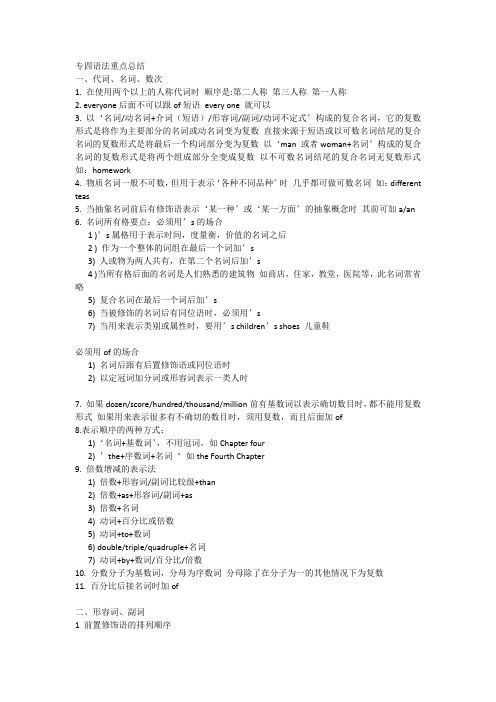
专四语法重点总结一、代词、名词、数次1. 在使用两个以上的人称代词时顺序是:第二人称第三人称第一人称2. everyone后面不可以跟of短语every one 就可以3. 以‘名词/动名词+介词(短语)/形容词/副词/动词不定式’构成的复合名词,它的复数形式是将作为主要部分的名词或动名词变为复数直接来源于短语或以可数名词结尾的复合名词的复数形式是将最后一个构词部分变为复数以‘man 或者woman+名词’构成的复合名词的复数形式是将两个组成部分全变成复数以不可数名词结尾的复合名词无复数形式如:homework4. 物质名词一般不可数,但用于表示‘各种不同品种’时几乎都可做可数名词如:different teas5. 当抽象名词前后有修饰语表示‘某一种’或‘某一方面’的抽象概念时其前可加a/an6. 名词所有格要点:必须用’s的场合1 )’s属格用于表示时间,度量衡,价值的名词之后2 ) 作为一个整体的词组在最后一个词加’s3) 人或物为两人共有,在第二个名词后加’s4 )当所有格后面的名词是人们熟悉的建筑物如商店,住家,教堂,医院等,此名词常省略5) 复合名词在最后一个词后加’s6) 当被修饰的名词后有同位语时,必须用’s7) 当用来表示类别或属性时,要用’s children’s shoes 儿童鞋必须用of的场合1) 名词后跟有后置修饰语或同位语时2) 以定冠词加分词或形容词表示一类人时7. 如果dozen/score/hundred/thousand/million前有基数词以表示确切数目时,都不能用复数形式如果用来表示很多有不确切的数目时,须用复数,而且后面加of8.表示顺序的两种方式:1)‘名词+基数词’,不用冠词,如Chapter four2) ’the+序数词+名词‘如the Fourth Chapter9. 倍数增减的表示法1) 倍数+形容词/副词比较级+than2) 倍数+as+形容词/副词+as3) 倍数+名词4) 动词+百分比或倍数5) 动词+to+数词6) double/triple/quadruple+名词7) 动词+by+数词/百分比/倍数10. 分数分子为基数词,分母为序数词分母除了在分子为一的其他情况下为复数11. 百分比后接名词时加of二、形容词、副词1 前置修饰语的排列顺序可以置于冠词前的形容词(all both such) -----冠词,指示形容词,所有格形容词,不定形容词(a an the this your his any some)-----------基数词(one ) 序数词(first)------------ 表示性质,状态,质量的形容词(good useful)--------------表示大小,长短,形状的形容词----------------表示年龄,新旧,温度的形容词------------表示颜色的形容词---------------------表示国籍,产地,区域的形容词-----------表示材料,用做形容词的名词----------动名词,分词2.后置修饰语由前缀a-构成的形容词3.形容词修饰由some-,any-,every-,no-,-body,-one,-thing等组成的复合不定代词时,必须后置4.enough作形容词修饰名词时既可放前又可放后,但当它作副词修饰形容词或副词时,必须后置5.有些形容词本身就有‘比……年长’,‘比……优等的意思这些形容词后面用介词to 而不用than6.much too 作为副词短语修饰形容词或副词,不修饰名词7.more 不能用来修饰比较级8.与名词连用的more of a .. ./ as much of a... / more of a.... 意为更像……9.as much of a……意为称得上,less of a 意为算不上10.none other than(不是别人,正是)=no other than11.any/sone/every与other连用时,其后若用可数名词,一般为单数三、情态动词、虚拟语气1.can 用于否定句cannot(help)but表示不能不,只能(but后跟不带to的动词不定式)2.must 表示禁止,一定不要时的否定式为mustn’t 当它表示有把握的推断时意为一定准是时它的否定形式为can’t3.need doing=need to be done 这个句型表示被动意味4.need not have done sth 表示本来没有必要做某事(经常考)虚拟语气1.It is (high/about/the)time... 谓语动词用过去式指现在或将来的情况表示早该做某事而现在已经有点晚了2.It is the first(second/third)time后的that从句中,谓语动词要用完成体来表示一种经验3.as if/though 的虚拟要点1) 对当时事实的假设,从句谓语用过去式,be动词一律用were2)对过去事实的假设,从句谓语用过去完成式3)对未来事实的假设,从句谓语用would+动词原型五、比较级比较等级的含义:英语中形容词与副词有三个比较等级,即原级,比较级和最高级。
(完整版)英语专业四级语法和词汇总结

1.nothing but意为“仅仅,只不过”;anything but意为“除…以外的任何事”;none other than 意为“不是别人,正是…”;no more than意为“不过,仅仅”。
2.A. taxes B. payment付款 C. fees 手续费、入场费、会费 D. premium津贴酬金3. A. display展示型表演 B. performance文艺表演 C. show展览会 D. exhibition销售性质的展览会4. No one would have time to read or listen to an account of everything ____going on in the world.A. it isB. as isC. there is 在以there be为谓语动词的定语从句中,如关系代词作主语,则关系代词便可省略D. what is5. A. set out 开始 as/in/on B. set off使做某事 C. set up 开业,开始经商D. set about开始、着手6. proliferation 扩散fair庙会、交易会7. tumble to 突然察觉come to意为“降临,发生8. understand better than...意为“对…非常理解”9. go with意为“与…相配”;go by意为“根据…作出判断”;go through意为“通过;经历”;go out意为“过时” go into意为“叙述;讨论10. on principle意为“根据行为准则;按照原则”;in principle意为“原则上;基本上;大体上”。
for与by不与principle搭配。
11. take over意为“接收,接管”;take up意为“开始采用;采取,承担”;take off意为“脱去;拿掉”;take to意为“开始从事;开始沉湎于”。
专四常考语法点
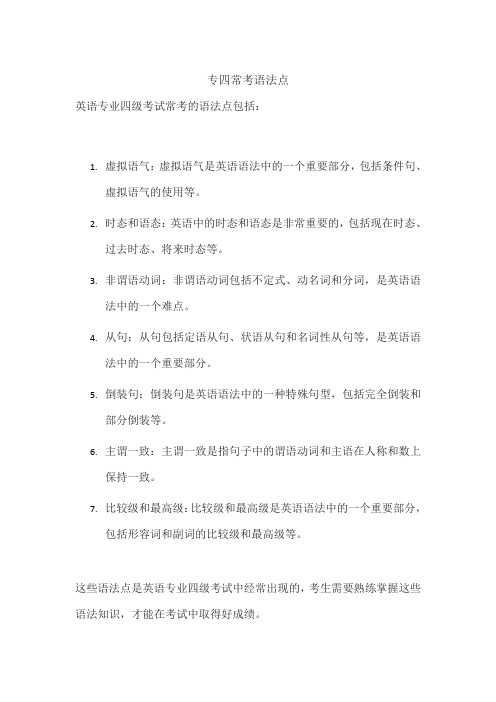
专四常考语法点
英语专业四级考试常考的语法点包括:
1.虚拟语气:虚拟语气是英语语法中的一个重要部分,包括条件句、
虚拟语气的使用等。
2.时态和语态:英语中的时态和语态是非常重要的,包括现在时态、
过去时态、将来时态等。
3.非谓语动词:非谓语动词包括不定式、动名词和分词,是英语语
法中的一个难点。
4.从句:从句包括定语从句、状语从句和名词性从句等,是英语语
法中的一个重要部分。
5.倒装句:倒装句是英语语法中的一种特殊句型,包括完全倒装和
部分倒装等。
6.主谓一致:主谓一致是指句子中的谓语动词和主语在人称和数上
保持一致。
7.比较级和最高级:比较级和最高级是英语语法中的一个重要部分,
包括形容词和副词的比较级和最高级等。
这些语法点是英语专业四级考试中经常出现的,考生需要熟练掌握这些语法知识,才能在考试中取得好成绩。
专四语法常见考点
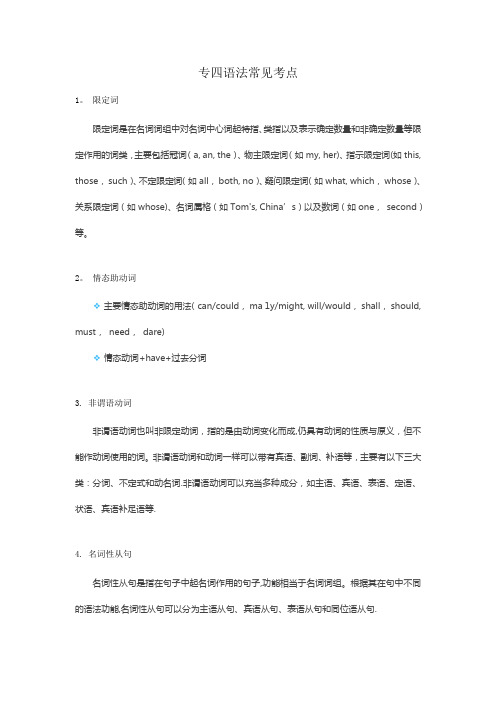
专四语法常见考点1。
限定词限定词是在名词词组中对名词中心词起特指、类指以及表示确定数量和非确定数量等限定作用的词类,主要包括冠词(a, an, the)、物主限定词(如my, her)、指示限定词(如this, those,such)、不定限定词(如all,both, no)、疑问限定词(如what, which,whose)、关系限定词(如whose)、名词属格(如Tom's, China’s)以及数词(如one,second)等。
2。
情态助动词❖主要情态助动词的用法(can/could,ma 1y/might, will/would,shall,should, must,need,dare)❖情态动词+have+过去分词3. 非谓语动词非谓语动词也叫非限定动词,指的是由动词变化而成,仍具有动词的性质与原义,但不能作动词使用的词。
非谓语动词和动词一样可以带有宾语、副词、补语等,主要有以下三大类:分词、不定式和动名词.非谓语动词可以充当多种成分,如主语、宾语、表语、定语、状语、宾语补足语等.4. 名词性从句名词性从句是指在句子中起名词作用的句子,功能相当于名词词组。
根据其在句中不同的语法功能,名词性从句可以分为主语从句、宾语从句、表语从句和同位语从句.5. 定语从句❖定语从句就是修饰名词或代词的从句,通常在被修饰词的后面,本质上相当于形容词的作用.被修饰的名词或代词叫做先行词。
❖定语从句分为限制性定语从句和非限制性定语从句。
限制性定语从句是先行词不可或缺的部分,去掉后主句意思往往不明确;非限制性定语从句是先行词的附加说明,去掉了也不会影响主句的意思,它与主句之间通常用逗号分开。
6。
状语从句如果一个从句用作状语,功能相当于副词并修饰动词、形容词或整个句子,那么该从句就是状语从句。
根据其作用,状语从句可分为时间、地点、条件、原因、让步、方式、比较、目的、结果等状语从句。
7。
时态与语态❖时态.英语主要的时态有12种,分别是:一般现在时,现在进行时,现在完成时,现在完成进行时;一般过去时,过去进行时,过去完成时,过去完成进行时;一般将来时,将来进行时,将来完成时,将来完成进行时。
英语专四语法和词汇

专业四级语法和词汇:Test 1 集体名词作主语主谓一致1)通常作复数的集体名词,如:police, people, cattle, militia, poultry等,通常作复数,用复数动词。
如: Domestic cattle provide us with milk, beef and hides.2)通常作不可数名词的集体名词,如:foliage, machinery, equipment, furniture, merchandise, 通常作不可数名词,随后的动词用单数。
例如:All the machinery in the factory is made in China.3)既可作单数也可作复数的集体名词,如:audience, committee, class, crew, family, public, government等,既可作单数,也可作复数用。
The city council is meeting to set its agenda.4)a committee,etc. of +复数名词如果主语是由“a committee of /a panel of /a board of +复数名词”构成,随后的动词通常用单数。
例如:A committee of five men and three women is to consider the matter.近义词辨析:tired, exhausted, fatigued, weary, worn out这组词均含有“疲惫的”的意思。
tired: 可指因体力或脑力消耗太多而需要休息,还可指因长期做某事而失去兴趣。
Henry was so tired that he went to bed immediately after he got home.亨利很疲惫,一到家就上床睡觉去了。
exhausted: 表达的疲惫程度最强,指因劳累过度而精疲力竭。
英语专业四级语法重点汇总

英语专业四级语法重点汇总English英语专八专四学习复习资料英语专四语法重点汇总一、非谓语动词的主要考点1. 有些典型动词后面可以接上不定式或动名词来做宾语的,但是在意思上是有区别的,主要常考到的动词罗列如下:mean to do想要(做某事)VS mean doing意味(做某事)propose to do 打算(做某事)VS propose doing建议(做某事)forget to do忘记(要做的事)VS forget doing忘记(已做的事)remember to do记得(要做某事)VS remember doing记得(做过)go on to do继而(做另一件事)VS go on doing继续(做原来的事)stop to do停下来去做另一件事VS stop doing停止正在做的事regret to do(对将要做的事)遗憾VS regret doing(对已做过的事)后悔2. 不定式的习惯用法典型句型整理如下:如:“cannot help but do”——“不得不做某事”如:“cannot but do”——“不禁做某事”如:“cannot choose but do”——“不由自主地做某事”如:“can do nothing but do”——“不能不做某事”如:“have no choice but to do”——“只能做某事”如:“have no alternative but to do”——“只能做某事”例句:The boy cannot help but be greatly influenced by the useful instruction given by his family tutor.When I start my job career, I cannot choose but look back upon the beautiful days I spent on campus.3. 动名词的习惯用法典型动名词的习惯句型整理罗列如下:如:be busy/active doing sth.如:It’s no good/use doing sth.如:spend/waste time doing sth.如:have difficulty/trouble/problem doing sth.如:have a good/great/wonderful time doing sth.如:There is no point/sense/harm/ use doing sth.例句:There is no use crying over spilt milk.(典型例句)牛奶洒了,哭也没用;后悔是没有用的;覆水难受I really have problem solving these mathematic questions since I am not major in science after all.二、形容词与副词及其比较级1. 形容词的句法功能形容词通常在句子中用做定语、表语与主语的语法成分,通常考到的知识点总结如下:(1) 以“a”开头的形容词如“alone”、“alike”、“asleep”、“awake”等一般不能做前置定语,通常是做表语或后置定语的例句:Jerry didn’t pass the important final exam, please let him alone for the time being.Michael came back from job just now, and his eyes were shut and he seemed to have fallen asleep.(2) 某些以副词词缀“-ly”结尾的词其实是形容词,不能看错是副词,例如“friendly”、“leisurely”、“lovely”等(3) 下列动词既是实义动词又是系动词,注意用做系动词时,要求形容词做表语这些典型单词罗列如下:“remain”、“keep”、“become”、“get”、“grow”、“go”、“come”、“turn”、“stay”、“stand”、“run”、“prove”、“seem”、“appear”、“look”等例句:The situation remains tense between the two countries at this juncture. 在这个节骨眼上,两国形势仍然持续紧张。
2023年英语专业四级考试词汇语法真题及解析
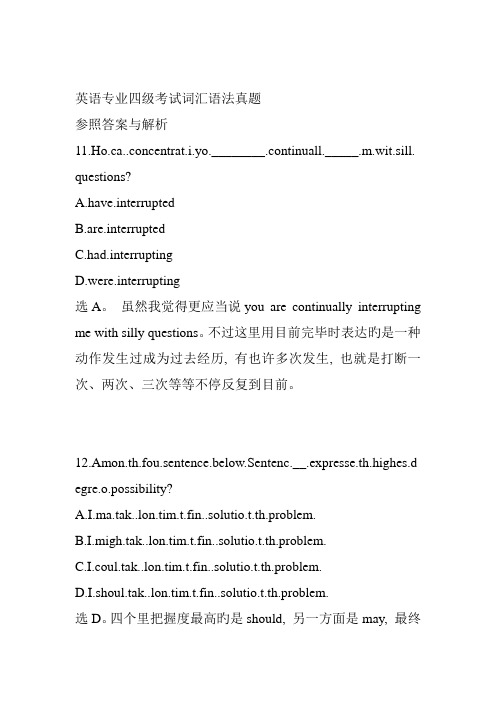
英语专业四级考试词汇语法真题参照答案与解析11.Ho.ca..concentrat.i.yo.________.continuall._____.m.wit.sill. questions?A.have.interruptedB.are.interruptedC.had.interruptingD.were.interrupting选A。
虽然我觉得更应当说you are continually interrupting me with silly questions。
不过这里用目前完毕时表达旳是一种动作发生过成为过去经历, 有也许多次发生, 也就是打断一次、两次、三次等等不停反复到目前。
12.Amon.th.fou.sentence.below.Sentenc.__.expresse.th.highes.d egre.o.possibility?A.I.ma.tak..lon.tim.t.fin..solutio.t.th.problem.B.I.migh.tak..lon.tim.t.fin..solutio.t.th.problem.C.I.coul.tak..lon.tim.t.fin..solutio.t.th.problem.D.I.shoul.tak..lon.tim.t.fin..solutio.t.th.problem.选D。
四个里把握度最高旳是should, 另一方面是may, 最终是might和could。
13.Sh.i..bette.speake.tha.____.i.th.class.A.an.boyB.th.othe.boysC.othe.an.girlD.al.th.girls选A。
主语是she, 女旳, 因此不能选B。
C旳对旳说法是any other girl。
14.Nobod.hear.hi.sing.______?A.di.oneB.di.heC.didn’.theyD.di.they选B。
(完整word版)英语专业四级考试语法汇总(word文档良心出品)

独立主格结构独立主格结构(Independent Genitive)有两部分组成,前一部份是名词或者代词,后一部分是非谓语动词(不定式、动名词和分词)或形容词、副词、或介词短语。
前后两部分具有逻辑主谓关系。
独立主格结构在句中做状语,多用于书面语。
独立主格结构本身不是句子,在句子中作状语,表示时间、原因、条件、伴随、目的等。
非谓语动词作状语,其逻辑主语须与主句主语保持一致。
若不一致,非谓语动词形式须另带主语,从而构成复合结构的形式作状语。
这种结构称为“独立结构”。
其中,非谓语动词主动用现在分词,被动用过去分词。
非谓语动词及其短语前面带有逻辑主语,逻辑主语的代词又是主格,故常称为“独立主格”。
“独立结构”在句中起状语作用,相当于状语从句,表示时间、原因、条件、方式或伴随等情况。
功能独立主格结构主要用于描绘性文字中,其作用相当于一个状语从句,常用来表示时间、原因、条件、行为方式或伴随情况等。
例如:表示时间The meeting being over, all of us went home. 开完会后我们都回家了。
Her work being done, she sat down for a cup of tea. 她干完了活,坐下来喝茶。
表示条件The condition being favorable, he may succeed. 若条件有利,他或许能成功。
表示原因There being no taxis, we had to walk. 没有出租车,我们只好步行。
He wrapped her up with great care, the night being dark and frosty. 夜又黑又冷,所以他把她裹得严严实实的。
表示伴随情况Almost all metals are good conductors, silver being the best of all. 几乎所有的金属都是良导体,而银则是最好的导体。
英语专业四级语法专题讲解
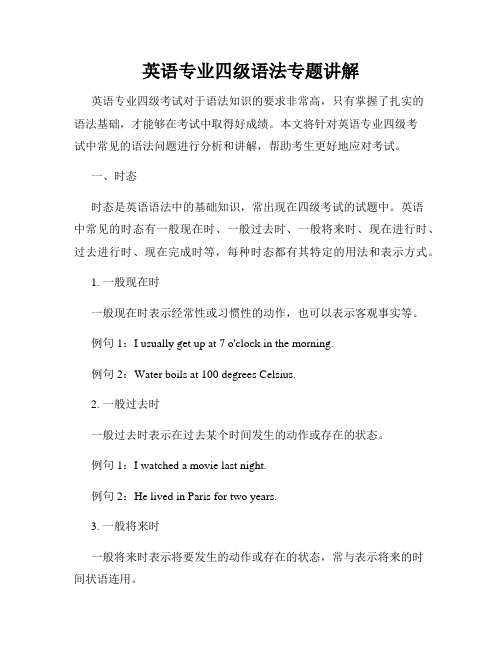
英语专业四级语法专题讲解英语专业四级考试对于语法知识的要求非常高,只有掌握了扎实的语法基础,才能够在考试中取得好成绩。
本文将针对英语专业四级考试中常见的语法问题进行分析和讲解,帮助考生更好地应对考试。
一、时态时态是英语语法中的基础知识,常出现在四级考试的试题中。
英语中常见的时态有一般现在时、一般过去时、一般将来时、现在进行时、过去进行时、现在完成时等,每种时态都有其特定的用法和表示方式。
1. 一般现在时一般现在时表示经常性或习惯性的动作,也可以表示客观事实等。
例句1:I usually get up at 7 o'clock in the morning.例句2:Water boils at 100 degrees Celsius.2. 一般过去时一般过去时表示在过去某个时间发生的动作或存在的状态。
例句1:I watched a movie last night.例句2:He lived in Paris for two years.3. 一般将来时一般将来时表示将要发生的动作或存在的状态,常与表示将来的时间状语连用。
例句1:I will visit my grandparents next weekend.例句2:She is going to travel around the world after graduation.4. 现在进行时现在进行时表示现在正在进行的动作。
例句1:They are studying in the library now.例句2:I am reading a book at the moment.5. 过去进行时过去进行时表示过去某个时间正在进行的动作。
例句1:She was cooking dinner when I arrived home.例句2:I saw him while he was walking in the park.6. 现在完成时现在完成时表示过去发生的动作对现在造成的影响或结果。
专业四级考试语法-虚拟语气(全)
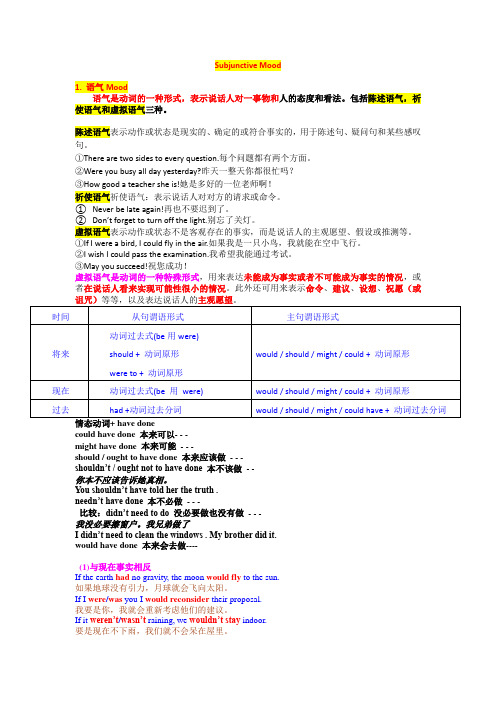
Subjunctive Mood1. 语气Mood语气是动词的一种形式,表示说话人对一事物和人的态度和看法。
包括陈述语气,祈使语气和虚拟语气三种。
陈述语气表示动作或状态是现实的、确定的或符合事实的,用于陈述句、疑问句和某些感叹句。
①There are two sides to every question.每个问题都有两个方面。
②Were you busy all day yesterday?昨天一整天你都很忙吗?③How good a teacher she is!她是多好的一位老师啊!祈使语气祈使语气:表示说话人对对方的请求或命令。
① Never be late again!再也不要迟到了。
② Don’t forget to turn off the light.别忘了关灯。
虚拟语气表示动作或状态不是客观存在的事实,而是说话人的主观愿望、假设或推测等。
①If I were a bird, I could fly in the air.如果我是一只小鸟,我就能在空中飞行。
②I wish I could pass the examination.我希望我能通过考试。
③May you succeed!祝您成功!虚拟语气是动词的一种特殊形式,用来表达未能成为事实或者不可能成为事实的情况,或者在说话人看来实现可能性很小的情况。
此外还可用来表示命令、建议、设想、祝愿(或could have done 本来可以- - -might have done 本来可能- - -should / ought to have done 本来应该做- - -shouldn’t / ought not to have done 本不该做- -你本不应该告诉她真相。
You shouldn’t have told her the truth .needn’t have done 本不必做- - -比较:didn’t need to do 没必要做也没有做- - -我没必要擦窗户。
英语专业四级语法汇总

语法回顾篇专四语法考点虚拟语气、情态动词、非谓语动词、复合句、倒装、小语法(省略,时态,反义疑问句,代词,强调句,主谓一致,冠词,形容词及副词)、as 的特殊用法。
专四英语语法考点串讲之一虚拟语气一般说来,有下列几种考点需要考生注意(十考点及两备考点)考点1. 与现在事实相反从句谓语动词用did(be用were),主句谓语动词would(should,could,might)+do;考点2. 与过去事实相反从句谓语动词用had done,主句谓语动词用would(should,could,might)+ have done;例如:43.I _________the party much more if there hadn‟t been quite such a crowd of people there.A. would enjoyB. will have enjoyedC. would have enjoyedD. will be enjoying49.All of us would have enjoyed the party much more if there _________ quite such a crowd of people there.A. weren‟tB. hasn‟t beenC. hadn‟t beenD. wouldn‟t考点3.与将来事实相反,从句谓语动词用:did(should+do或were + to do),主句谓语动词用:would(should,could,might)+do。
例如:43. If your car ___ any attention during the first 12 months, take it to an authorized dealer.(08年)• A. shall need C. would need• B. should need D. will need考点4. 时态的交叉现象,也就是主句与从句的动作发生在不同的时间段例如:If you had gone to see the doctor,you would be all right now.你要是早去看病,你现在就没事了。
英语专业四级语法
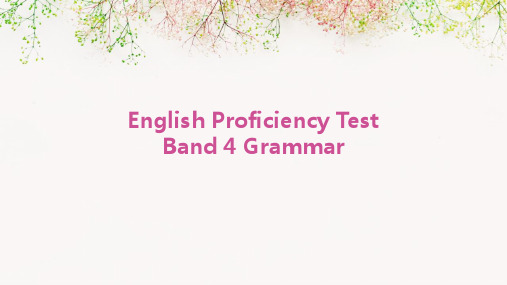
Adjectives
Adjective is a part of speech that modifies a noun or pronoun.
Adjectives are words that describe nouns or pronouns, giving more information about them. They can be descriptive (e.g., "big") or limiting (e.g., "these").
例子:The excited children were jumping up and down. (定语)
The man wounded in the war is now retired. (定 语)
The boy standing over there is my brother. (定语)
04
verb
Verb is a part of speech that expresses action or state of being.
Verbs are words that show what someone or something is doing. They can be simple (e.g., "run") or complex (e.g., "running").
preposition
Preposition is a part of speech that shows relationship between noun and other parts of sentence.
Prepositions are words that show spatial or temporal relationships, such as "in," "on," or "after." They are often
- 1、下载文档前请自行甄别文档内容的完整性,平台不提供额外的编辑、内容补充、找答案等附加服务。
- 2、"仅部分预览"的文档,不可在线预览部分如存在完整性等问题,可反馈申请退款(可完整预览的文档不适用该条件!)。
- 3、如文档侵犯您的权益,请联系客服反馈,我们会尽快为您处理(人工客服工作时间:9:00-18:30)。
最新英语专业四级考试考试内容:本考试共有六个部分:听写、听力理解、完型填空、语法与词汇、阅读理解、写作。
整个考试需时130分钟。
8:30开考Ⅰ.听写(Part Ⅰ: Dictation) 15’ 比重15%1.测试要求:(a)能在全面理解内容的基础上逐字逐句写出所听材料。
(b)拼写和标点符号正确无误,错误率不超过8%。
(c)考试时间15分钟。
2.测试形式:本部分为主观试题,所听材料共念四遍。
第一遍用正常语速朗读,录音语速为每分钟120个单词,让学生听懂材料大意,第二三遍朗读时意群、分句和句子之间留出约15秒的空隙,让学生书写,第四遍再用正常语速朗读,让学生检查。
3.测试目的:测试学生听力理解能力拼写熟练程度以及正确运用标点符号的能力。
4.选材原则:(a)题材广泛体裁多样。
(b)听写材料难度以不超过《大纲》规定为准。
(c)听写材料长度约150个单词。
8:50收卷Ⅱ.听力理解(Part Ⅱ: Listening Comprehension) 30’ 比重15%1.测试要求:(a)能听懂英语国家人士关于日常生活和社会生活的谈话,以及中等难度(如TOEFL中的短文)的听力材料。
能理解大意,领会说话者的态度感情和真实意图。
(b)能听懂相当于VOA正常语速和BBC新闻节目的主要内容。
(c)能辨别各种英语变体(如美国英语、英国英语、澳大利亚英语等)。
(d)考试时间约20分钟。
2.测试形式:本部分采用多项选择题,分三节:Section A,Section B,Section C,共30题。
Section A: Conversations本部分含有若干组对话,每组约为200个单词。
每组对话后有若干道题。
本部分共有10题。
Section B: Passages本部分含有若干篇短文,每篇长度约为200个单词。
每篇后有若干道题。
本部分共有10题。
Section C: News Broadcast本部分含有若干段VOA或BBC新闻,每段新闻后有若干道题。
本部分共有10题。
本部分后有5秒的间隙,要求学生从所给的四个选项中选出一个最佳答案。
录音语速为每分钟约120个单词,念一遍。
3.测试目的:测试学生获得口头信息的能力。
4.选材原则:(a)对话和短文中的部分内容与日常生活和学习活动相关。
(b)VOA和BBC新闻材料为学生所熟悉的一般新闻报道、短评或讲话等。
(c)听写材料中所出现的词语原则上不超出《大纲》规定的范围。
Ⅲ.完型填空(Part Ⅲ: Cloze) 20’ 比重10%1.测试要求:(a)能在全面理解所给短文内容的基础上,选择一个最佳答案使短文意思和结构恢复完整。
(b)考试时间15分钟。
2.测试形式:本部分采用多项选择题。
在一篇约250个单词、题材熟练难度中等的短文中留出20个空白,每个空白为一题,每题有四个选项,填空的词涉及语法和词汇。
3.测试目的:测试学生的综合语言知识和能力。
Ⅳ.语法与词汇(Part Ⅳ: Grammar and Vocabulary) 30’ 比重15%1.测试要求:(a)掌握并能运用《大纲》规定的一至四级语法内容。
(b)掌握《大纲》规定的基础阶段认知词汇(5500-6000),并且能正确、熟练地运用其中的3000-4000个单词及其最基本的搭配。
(c)考试时间15分钟。
2.测试形式:本部分采用多项选择题。
共30道题,每题有四个选项。
题目中约50%为词汇词组和短语用法题,其余为语法结构题。
3.测试目的:测试学生掌握词汇短语及基本语法概念的熟练程度。
Ⅴ.阅读理解(Part Ⅴ: Reading Comprehension) 20’ 比重20%1.测试要求:(a)能读懂英美国家出版的中等难度的文章和材料。
(b)能读懂难度相当于美国Newsweek的国际新闻报道。
(c)能读懂难度相当于Sons and Lovers的文学原著。
(d)能掌握所读材料的主旨大意,了解说明主旨大意的事实和细节;既理解字面意思,又能根据所读材料进行判断和推理;既能理解个别句子的意义,也理解上下文的逻辑关系。
(e)能在阅读中根据需要自觉调整阅读速度和阅读技巧。
(f)考试时间25分钟。
2.测试形式:本部分采用多项选择题,由数篇阅读材料组成。
阅读材料共长1800个单词左右。
每篇材料后有若干道题。
学生应根据所读材料内容,从每道题的四个选项中选出一个最佳的答案,共20道题。
3.测试目的:本部分测试学生通过阅读获取有关信息的能力,考核学生掌握相关阅读策略和技巧的程度,既要求准确性,也要求一定的速度。
阅读速度为每分钟120个单词。
4.选材原则:(a)题材广泛,包括社会、科技、文化、经济、日常知识、人物传记等。
(b)体裁多样,包括记叙文、描写文、说明文、议论文、广告、说明书、图表等。
(c)阅读材料的语言难度中等,关键词汇基本上不超出《大纲》规定的范围。
10:00收卷Ⅵ.写作(Part Ⅵ: Writing)1.测试要求:(a)作文:能根据所给的作文题目、提纲或图表、数据等,写一篇200个单词左右的作文。
能做到内容切题、完整,条理清楚,结构严谨,语法正确,语言通顺,表达得体。
考试时间35分钟。
(b)便条:能根据所给提示写50至60个单词的便条、通知、请贴等。
能做到格式正确,语言得体。
考试时间10分钟。
2.测试形式:本部分分为主观试题,分两节:Section A和Section B。
Section A: Composition 15’ 比重15%本题是命题作文,文章体裁主要属于说明文、议论文或记叙文的范围。
Section B: Note-Writing 10’比重10%本节是写便条。
3.测试目的:按照《大纲》的要求测试学生书面表达的能力。
10:45收卷答题和计分作文和听写做在规定的主观题答题卷上,多项选择题的答案写在客观题答题卷上。
凡是写在试题册上的一律无效,予以作废。
试卷各部分采用记权方式折算成百分制。
以60分为及格标准。
专四证书分三个等级:60-69分合格;70-79分良好;80分以上优秀。
语法总结回顾专四语法考点虚拟语气、情态动词、非谓语动词、复合句、倒装、小语法(省略,时态,反义疑问句,代词,强调句,主谓一致,冠词,形容词及副词)、as 的特殊用法。
英语专业四级考试历年各语法考点的分布表专四英语语法考点串讲之一虚拟语气一般说来,有下列几种考点需要考生注意(十考点及两备考点)考点1. 与现在事实相反从句谓语动词用(be用),主句谓语动词( , might)+do;考点2. 与过去事实相反从句谓语动词用,主句谓语动词用( , , might)+ have done;例如:43. I _________the party much more if there hadn’t be en quite such a crowd of people there.A. would enjoyB. will have enjoyedC. would have enjoyedD. will be enjoying49. All of us would have enjoyed the party much more if there _________ quite such a crowd of people there.A. weren’tB. hasn’t beenC. hadn’t beenD. wouldn’t考点3.与将来事实相反,从句谓语动词用:( + do或+ to do),主句谓语动词用:(should, could, might)+do。
例如:43. If your car ___ any attention during the first 12 months, take it to an authorized dealer. (08年)A. shall need C. would needB. should need D. will need考点4. 时态的交叉现象,也就是主句与从句的动作发生在不同的时间段。
例如:If you to see the doctor,you all right now.你要是早去看病,你现在就没事了。
考点5. 虚拟条件句if可以省略,但从句的语序要用到装,即,但否定词not不前移。
例如:65.___, he would not have recovered so quickly.(05年)A. Hadn't he been taken good care ofB. Had he not been taken good care ofC. Had not he been taken good care ofD. Had he been not taken good care of考点6. (一个坚持);, (两道命令);, , (三条建议);, , , (四点要求)及相应的名词的从句,谓语要使用:should+动词原形或动词原形。
例如:58. It was recommended that passengers ___ smoke during the flight. (04年)A. notB. need notC. could notD. would not考点7.It is + , , , ,等等相关的从句,谓语要使用:should+动词原形或动词原形。
例如:46. It is imperative that students ____ their term papers on time.(04年)考点8.it is high(about) time that的结构中,从句使用。
例如:54. It’s high time we __ cutting down the rainforests.(06年)A stoppedB had to stopC shall stopD stop考点9.much as尽管,虽然,引导让步状语从句,从句中用表示假设,可以是说话人的语气变得十分委婉,真诚。
例如:52. Much as ____, I couldn’t lend him the money because I simply didn’t have that much spare cash.(99年)A.I would have liked toB.I would like to haveC.I should have to likeD.I should have liked to考点10. if only表示要是…就好了,相当与wish, as if/as though 的用法。
与现在事实相反:;与过去事实相反: ;与将来事实相反:例如:52. If only I __play the guitar as well as you! (06 年)A wouldB couldC shouldD might备考1. would rather或would sooner后跟宾语从句,从句中使用或过去完成式分别表示对现在或过去的虚拟,表示。
